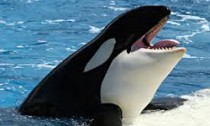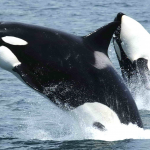
SeaWorld plans to phase out its famous Shamu show at its San Diego park next year after mounting criticism over its treatment of killer whales. The entertainment parks have faced a huge backlash from animal rights groups who have protested against the conditions orcas are kept in. Visitor numbers have also plummeted since release of the 2013 documentary Blackfish which claimed SeaWorld’s treatment of its captive orcas provoked violent behaviour in the whales, leading to the deaths of three people.
The company, which operates 11 theme parks across the U.S., also reported a profit of $5.8million for April to the end of June – 7 cents per share – which was down from $37.4million for the same period last year. To counter the backlash, the firm, which has participated in animal rescue programs for more than 50 years, announced plans to nearly double the size of its orca enclosures.
The decision comes after a ruling by the California Coastal Commission which will ban the park from breeding any more orcas as part of a deal to expand the mammals’ enclosures.
But their plans for a new orca experience in a more natural setting hit a snag after after the California Coastal Commission ruled that SeaWorld would only be allowed to expand their tanks if the company agreed to end its orca breeding program. The park’s ambitions to expand were also met with opposition from animal rights groups and their supporters who wanted to see the park’s collection of 11 killer whales released to the wild instead.
SeaWorld has already pledged to fight the California Coastal Commission’s ruling which would effectively bring an end to its traditional centerpiece orca shows – named for the original Shamu of the 1960s and early 1970s.
But the entertainment park group appear to be facing an uphill struggle as both the state and government crack down on the breeding of killer whales.
California Rep. Adam Schiff announced on Friday plans to introduce the Orca Responsibility and Care Advancement (ORCA) Act, which will phase out the captivity of killer whales by banning breeding, importing and exporting the animals for public display.
The aim is for all orcas now at aquatic parks such as SeaWorld to be the last ones and that when they die, none will replace them. The bill also would ban taking any whales from the wild.
SeaWorld has also faced allegations of animal cruelty over the company’s treatment of their orcas from park customers.
In April this year, they were accused of drugging killer whales, painting over their injuries and keeping them in pools so shallow they get sunburned.
A lawsuit filed by Joyce Kuhl, a grandmother from South Carolina who visited the Orlando park in 2013, claimed orcas are being kept in 8ft deep holding pools, leaving the marine animals ‘essentially roasting’.
Ms Kuhl alleged that the resulting burns are so bad staff are forced to paint the orcas with black zinc oxide to disguise the injuries
Ms Kuhl wants to have her $97 ticket reimbursed, as well as tickets for millions of other visitors who have been to the park in the past four years, accusing SeaWorld of ‘false, misleading and deceptive business practices,’ the Orlando Sentinel reported.
In her suit she also alleged that the giant marine mammals are being deprived of food for days while being trained to perform at SeaWorld, and that the chlorine used in their tanks is ‘many times stronger than household bleach’.
Kuhl’s suit details allegations of forced breeding, incestuous inbreeding and whales kept together in ways that make them hyper-aggressive so that they fight and inflict deep gashes on each other.
It was the second lawsuit against SeaWorld in less than one month, with similar filed in California which accuse the company of ‘misleading the public’ by claiming that their killer whales are happy.
The lawsuits followed a failed social media campaign last month, during which SeaWorld organised a Q&A on Twitter using the hashtag #AskSeaWorld.
Instead of the intended questions about opening hours, animals and attractions, the company was asked if their ‘tanks were filled with orca tears’.
Many people used the opportunity to express their anger at the company and questioned its ethics for keeping killer whales and other animals in captivity, often in solitary confinement.
User @AshleeCheese_ tweeted: ‘Why do you keep breeding whales when you barely have enough room for one? #AskSeaWorld.’
Animal rights group PETA was quick to make its views known, tweeting a series of photographs of the marine creatures, reportedly showing signs of their distress.
The backlash came two years after the release of the documentary BlackFish, which focused on the treatment of killer whales after Tilikum’s fatal attack on trainer Dawn Brancheau at SeaWorld Orlando in 2010.
The 80-minute film, which premiered at Sundance in 2013, prompted questions about the ethics of keeping the large mammals in tanks.
SeaWorld’s alpha-male killer whale Tilikum, which is the park’s primary breeding whale and currently lives in captivity at SeaWorld Orlando, Florida – has been involved in the deaths of three people during his time in captivity, including two trainers and a man who was trespassing in the park.
Marine biology student Keltie Byrne, 20, was killed in February 1991 when she fell into a pool containing Tilikum and two other whales.
The three whales dragged her around the pool, forcing her underwater, in front of horrified spectators as she screamed for help.
Tilikum was moved to SeaWorld Orlando, Florida, shortly after the death.
The second trainer, veteran trainer Dawn Brancheau, 40, was killed in February 2010, following a show.
Tilikum reportedly grabbed her and pulled her into the water. Ms Brancheau suffered horrific injuries in the attack, including the loss of an arm.
The documentary also challenged claims made by the parks that the lifespans of captive orcas are comparable to those in the wild, and highlights the extreme stress suffered by the whales when their offspring were captured in the wild or when separated after breeding at water parks.
SeaWorld allegedly suffered losses following the release of the documentary, although the company has disputed the claims. Attendance was reported to have fallen from 23.4million in 2013 to 22.4million in 2014.
SeaWorld has since hit back against the critically-acclaimed 2013 documentary earlier this year, saying its claims were false.
Fox launched an investigation which set out to prove that Blackfish exaggerated its account, and claims it relies of footage of one-off incidents and outdated practices.
But many of the experts who spoke in Blackfish have snubbed the new documentary, and have refused to appear.
Critics also claim the Fox investigation relies heavily on cooperation from SeaWorld, as the multi-million dollar company attempts to repair its damaged reputation.















Social Profiles